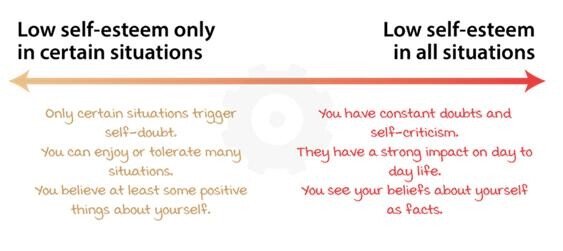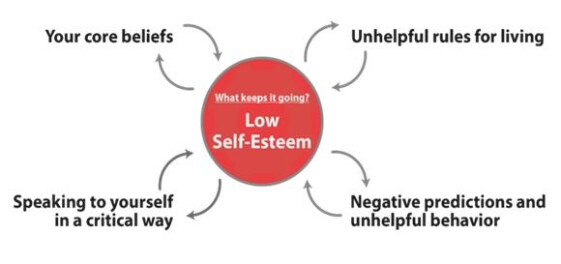Treatments for low self-esteem
May 2, 2022 | by Dr Matthew Whattey by Dr Hardeep Kaur
Treatments for low self-esteem
By Dr Matthew Whalley & Dr Hardeep Kaur

What is low self-esteem?
Self-esteem is the opinion you have of yourself. When you have healthy self-esteem, you tend to think positively about yourself, and optimistically about life in general. People with healthy self-esteem know that they are valuable, and will be able to name at least some of their positive qualities, such as “I am a good friend”, “I am kind”, “I am honest”, or “I am a good father”.
When you have low self-esteem, you tend to see yourself, the world, and your future more negatively and critically. You might feel anxious, sad, low, or unmotivated. When you encounter challenges, you may doubt whether you will be able to rise to them. You might talk to yourself harshly in your mind, telling yourself things like “You’re stupid”, “You’ll never manage this”, or “I don’t amount to anything”.
Your self-esteem affects how you live your life, but it is fragile. If you have low self-esteem, you might be always trying to please other people, or go ‘above and beyond’ at work or with your friends and family. As long as you keep meeting these standards you may feel OK, but there will inevitably be times when it’s not possible to do so, and this can quickly leave you feeling low and anxious.
Self-esteem exists on a spectrum. Some people with low self-esteem find that it only affects them with certain people, or in certain situations. Other people find that their self-esteem colors everything they do.

What is it like to have low self-esteem?
Rosie’s belief that she was not good enough
I grew up in a family of doctors and scientists. While I was growing up, I always felt compared to my sister, ‘the good one’. I was more active and energetic than her, and I loved climbing trees and running around with the dog. I often got told off for that. As I got older, people kept comparing me to my sister (“Why can’t you be more like her?”) and I started to wonder if there was something wrong with me. My sister was always well behaved at home and school. Even the teachers compared me to her, which left me feeling like I wasn’t good enough. I didn’t achieve as well as my sister academically, and I went on to work for the local council. My sister, on the other hand, became a doctor and our parents always praised her achievements. I felt like I was a failure, and the odd one out in my family.
I came to therapy when I was thirty. I was burnt out at work and my relationship had just ended after four years. I felt depressed, as if I had failed at life. I always gave 110%, I’d always tried to do everything perfectly at work and never wanted to let anyone down, even if it meant saying yes to extra work even when I was already overwhelmed. This meant that I had little time for my partner or my friends, but I worried that if I said no, my boss would think I wasn’t up to the job. Once, I got a 3 out of 5 on one of my competencies in my appraisal, and I felt like I was a complete failure. As a result, I worked even harder, and I worried about making mistakes or getting things wrong: I was always putting myself down.
What causes low self-esteem?
At the centre of low self-esteem are the negative beliefs and opinions you hold about yourself. Nobody is born with beliefs like this – they develop as a result of the experiences you have throughout your life. How other people treat you, particularly when you are growing up, can greatly affect upon how you see yourself. Experiences that make you more likely to develop low self-esteem include: Experiences such as punishment, abuse, or neglect. Punishment, abuse, and neglect are very powerful experiences. Children who experience them often jump to the mistaken conclusion that they are bad and must have deserved what happened to them.
Insufficient warmth, affection, praise, love, or encouragement.
You might not remember anything overtly traumatic happening, and wonder why you feel the way you do about yourself. It is possible to develop low self-esteem without specific negative experiences, but simply through a deficit of enough positive ones. Without enough reinforcement that they are good, special, or loved, children can form the impression that they are not good enough.
Failure to meet other people’s expectations.
You might feel that you are not good enough because you didn’t meet someone else’s expectations. These might have been your parent’s standards, or some other authority figure. For many people with low self-esteem, it doesn’t seem to matter whether the standards were fair or balanced in the first place – the part that ‘sticks’ is them not meeting these standards.
Inability to fit in with your peer group.
Belonging to a ‘group’ or a ‘tribe’ is important – it’s one of our survival needs. Being different or the ‘odd one out’, especially during adolescence when you are forming your identity, can powerfully impact your sense of self.
What keeps low self-esteem going?
Research studies have shown that
Cognitive Behavior Therapy (CBT) is one of the most effective treatments for low self-esteem [2]. CBT therapists work a bit like firefighters: while the fire is burning they’re not so interested in what caused it, but are more focused on what is keeping it going, and what they can do to put it out. This is because if they can work out what keeps a problem going, they can treat the problem by interrupting this maintaining cycle. A psychologist called Melanie Fennell developed an influential cognitive behavior model of low self-esteem. [3]. Dr Fennell’s model says that:
Throughout your life you form negative beliefs about yourself as a result of the way you have been treated. Psychologists call this your ‘bottom line’ or ‘core belief’. Your core belief is how you feel about yourself deep down, for example “I’m worthless” or “I’m no good”.
Confronting core beliefs feels unpleasant, so we all develop rules for living that protect us from our core beliefs. These rules guide how you live your life, and as long as your rules don’t get broken, your core belief stays dormant. People with low self-esteem often have rules that are demanding and rigid, such as “I must always please other people”, or “As long as I don’t get criticized then I’m OK”.
It can feel very anxiety provoking when it seems like one of your rules might be broken. If one of your rules is “I’m OK as long as everyone is happy”, it might be anxiety provoking if people around you are not happy – you might feel that you have failed.
When there is a danger that rules might be broken, you might make anxious predictions about what might happen and fear the worst (e.g. “I’ll be rejected if I can’t do everything that is expected of me”), or you might speak to yourself in a critical way, or avoid tricky situations and use strategies to cope.
Fennell states that all of these elements fit together. Your rules were developed to protect you, but are often rather inflexible and they can stop things from getting better. Although your
safety strategies can make you feel good in the short-term, all of them can keep your
core belief from changing, and your self-esteem doesn’t improve.

Treatments for low self-esteem / Psychological treatments for low self-esteem
A number of psychological treatments have been developed which directly target low self-esteem or self-criticism. These include cognitive behavioral therapy (CBT), competitive memory training (COMET), and compassion focused therapy (CFT).
There is evidence that they are effective forms of treatment [4,5,6,7,8, 9, 10]. There is also some overlap with psychological treatments for depression. Ingredients of effective CBT for low self-esteem include:
- Identifying your core beliefs
- Identifying your rules for living
- Developing healthier (more flexible) rules and beliefs
- Testing your negative predictions using behavior experiments
- Facing your fears and confronting anxiety - provoking situations
- Replacing self -criticism with self compassion
- Living in line with your new core beliefs
This article was written by Dr Matthew Whalley and Dr Hardeep Kaur, both clinical psychologists. It was last reviewed on 2021/12/09.
 For additional instructions click here to read
For additional instructions click here to read
Pastor Carter's teaching on
Developing Godly self esteem.




